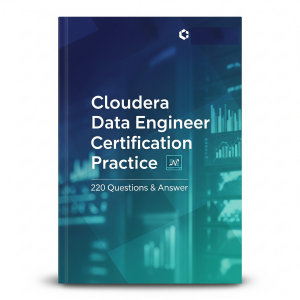Cloudera Data Engineer Certification Practice 300 Questions & Answer: Pass the Cloudera Data Platform Data Engineer exam. Master Spark, Airflow, Iceberg, performance tuning, security, and deployment with a hands-on study guide.
About this ebook
Created by QuickTechie.com, this book gives data engineers end-to-end coverage of CDP skills—from building robust pipelines with Apache Spark and Apache Airflow to optimizing storage with Apache Iceberg, tuning performance, hardening security, and deploying on cloud.
You’ll learn how to design, develop, and optimize data workflows on Cloudera—covering data modeling, partitioning, schema design, resource management, monitoring, and troubleshooting—with a strong focus on Spark over Kubernetes, Hive–Spark integration, and distributed persistence.
What you’ll learn (mapped to the exam)
Apache Spark (48%): Spark on Kubernetes, DataFrames, distributed processing, Hive–Spark integration, storage & persistence patterns.
Performance Tuning (22%): Reading and acting on explain plans, join optimization, schema inference, caching strategies, partitioned/bucketed tables, tooling for Spark tuning.
Apache Airflow (10%): Incremental extraction, scheduling complex ETL, data quality checks, production-ready DAG design.
Deployment (10%): Using APIs/CLI, operating within the Data Engineering Service, build & release hygiene.
Apache Iceberg (10%): Table formats, schema evolution, partitioning design, and CDP-specific best practices.
Who this book is for
Data Engineers building on Cloudera who need a clear, practice-driven path to certification.
Professionals seeking confidence with Spark performance, Airflow orchestration, Iceberg tables, security setup, cluster health monitoring, and cloud integration.
Why this book stands out
Exam-aligned coverage based on the skill weights used in the official blueprint.
Hands-on guidance with real-world patterns for throughput, cost, and reliability.
Clarity first: step-by-step explanations you can apply immediately in CDP.
Exam facts (for quick reference)
Format: 50 questions • Time: 90 minutes • Passing score: 55%
Delivery: Online, proctored (verify system requirements via QuestionMark).
Closed book: No external resources allowed during the exam.
This guide is designed to be self-contained, so you’re fully prepared without outside materials.
Inside the book
Spark on Kubernetes fundamentals and cluster-aware patterns
DataFrames best practices and distributed processing paradigms
Airflow DAG design for incremental & quality-checked pipelines
Interpreting explain plans; choosing the right join & partition strategy
Caching/persistence trade-offs for cost and performance
Iceberg schema evolution and partitioning for lakehouse reliability
API/CLI deployment workflows in CDP Data Engineering Service
Security setup, monitoring, and troubleshooting checklists







